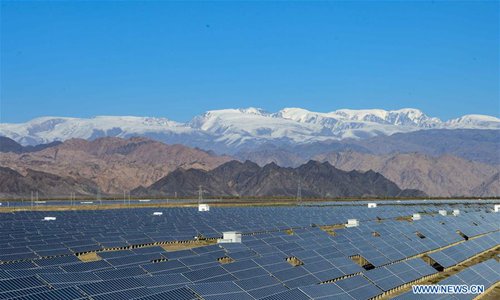China Photovoltaic Industry Association opposes US Xinjiang bill that curbs the development and progress of Xinjiang

Photo taken on Sept. 20, 2018 shows a PV power plant in Hami, northwest China's Xinjiang Uygur Autonomous Region. Xinjiang has seen a surge in the electricity generation from clean energy. According to State Grid Xinjiang Electric Power Co., Ltd., wind and solar power generated 27.81 billion and 9.07 billion kilowatt hours (kwh) of electricity, respectively, in the first nine months of 2018 in the region. With abundant wind and solar resources, Xinjiang is a pioneer in using new energy in China, with installed new-energy capacity having exceeded 27 million kilowatts so far. (Xinhua/Zhao Ge)
The China Photovoltaic Industry Association (CPIA) strongly opposes the signing into law of the so-called Uyghur Forced Labor Prevention Act, condemning the US bill as it “disregards the truth, seriously violates international law and basic norms governing international relations and seriously and rudely damages China's overall interests.”
The bill excludes products from the northwest China's Xinjiang Uygur Autonomous Region from entering the US market. This has aroused great indignation in Chinese society and the photovoltaic industry, the CPIA said in a statement on Tuesday.
The statement came after several industry associations, including the China Enterprise Confederation, the China Cotton Association and the China National Textile and Apparel Council, recently expressed their opposition to the US bill.
The so-called forced labor issue is the lie of the century created out of thin air by the agencies and personnel of certain Western countries, like the US, which seriously distorts the actual working conditions of employees of industrial enterprises in Xinjiang, said the CPIA.
Photovoltaic (PV) enterprises in Xinjiang strictly comply with international practices in production and operation and there is no evidence to prove there is "forced labor" in the production of PV products in Xinjiang.
Promoting the development of renewable energy through PVs and jointly tackling climate change have become the common development goals of countries around the world.
In fact, the development of polysilicon and PV industries in Xinjiang has played an important role in promoting the global solar power industry and reducing the cost of power generation.
At present, Xinjiang's polysilicon output accounts for 45 percent of the world's total output and has become an integral part of the global PV industry chain, according to industry reports.
“As countries step up their climate change commitments, we need more cooperation, not division, and healthy competition, not vicious smears. The US has imposed its long-arm jurisdiction under the pretext of ‘forced labor.’ In essence, the US intends to smear China's PV industry in Xinjiang to curb the development and progress of the region and prevent all Chinese people in Xinjiang from pursuing a better life,” the statement by the CPIA said.
